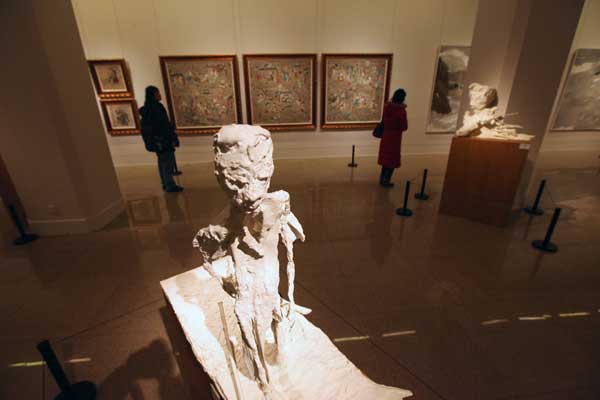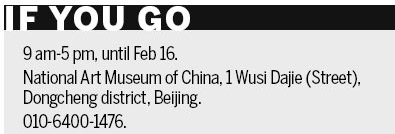

 |
|
Paintings and sculptures are shown at ChiFra. Jiang Dong / China Daily |
Xu Beihong, Lin Fengmian, Sanyu (Chang Yu) and Wu Guanzhong, are the names that not only represent the development of Chinese oil painting spanning over a century, but also bear witness to a splendid era of the Sino-French artistic exchanges.
Today, their disciples have teamed up with a dozen French counterparts to share views on common challenges of art in the context of globalization, through the media of oil, pencil and bronze.
ChiFra displays more than 100 works, largely paintings and some sculptures, of Chinese and French artists who are active in their circles. The exhibition, after its weeklong debut at the Avenue des Champs-Elysees that attracted thousands of viewers last October, is now housed at the National Art Museum of China.
Though the communications between the two countries could be traced back to as early as the mid-13th century, it was not until the 1920s that the French art started to significantly influence the Middle Kingdom. The decade saw the first wave of Chinese artists swarming to France, mostly to Paris, to study Western art. They were deeply steeped in the emergence and mingling of various art movements and painting schools, and many later became the pillars of Chinese modern art.
And these pioneering artists took different approaches to lay a solid foundation of Chinese oil painting: the realist style heralded by Xu Beihong and Yan Wenliang who inherited the academic art traditions, and the plural orientation artists such as Liu Haishu and Pang Xunqin initiated under the impact of modern art.
But ChiFra is far more a reflection upon the past and history. Artists and audiences in both countries can almost touch each other's mind, by gazing closely at the cultural landscapes of the moment.
Deng Xihong, ChiFra's sponsor and president of the France-based Sophia Art Foundation, says the exhibition chose painting as the main medium because they wanted to save the art of painting from being further marginalized.

The second half of the 20th century was marked by vibrant artistic adventures, and the concerns about the death of painting were frequently evoked. The exhibition tries to convey the liveliness and fertility of painting as a vehicle of thought and feelings in two separate but well-connected countries. "It's a return to the origin of art, and to the basics of the spirit. It presents a clear cultural identity - artists who stand on the basis of their home cultures and insist on painting," Deng says.
NAMOC's director Fan Di'an says that if art, in the traditional concept, gave a royal portrait of nature; today it is a mirror of society and people's soul. "The dramatic changes of the real world have been providing abundant sources of creation for the Chinese contemporary art.
"The exhibition shows that Chinese artists have been more independent to explore their own styles. They've found many possibilities to express their concerns with the aid of tools as simple and straightforward as either oil paint or ink," he says.
ChiFra will also be held at Shenzhen's Guanshanyue Art Museum and Chongqing Art Museum.